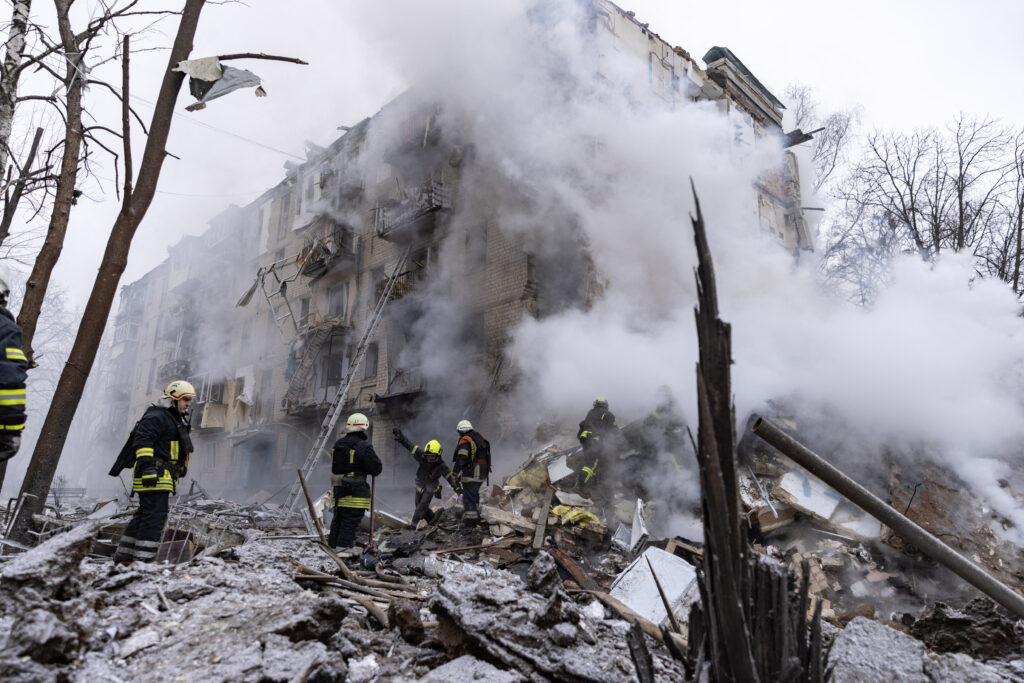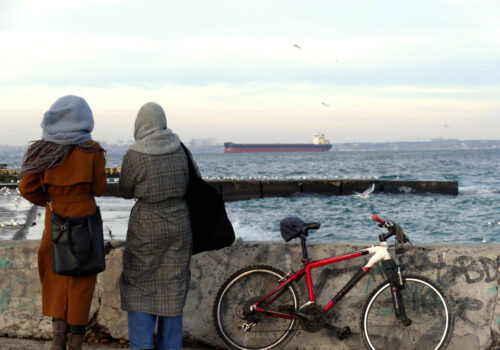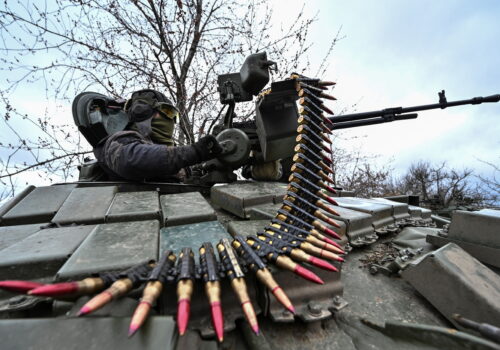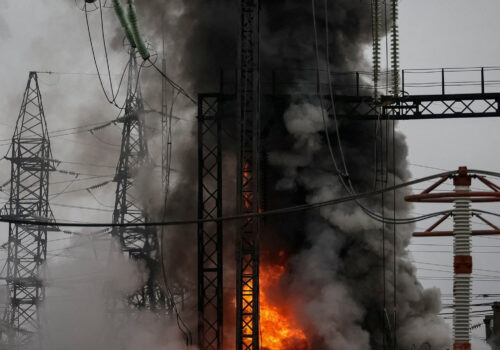The landmark US aid bill signed by President Biden on April 24 has visibly boosted morale in Ukraine. Many analysts believe the $61 billion package will significantly improve Ukraine’s military outlook, easing months of critical supply shortfalls and creating new opportunities to strike back at the invading Russian army.
While most attention has so far focused on the military aspects of this new US aid package, the bill passed in Washington DC also includes an important step toward holding Russia financially accountable for the invasion of Ukraine. The Rebuilding Economic Prosperity and Opportunities for Ukrainians Act, or REPO Act, paves the way for seizures of Russian Central Bank holdings that have been frozen in the United States for more than two years, while also setting the stage for a more global approach to confiscating Russian assets.
Western countries froze approximately $300 billion in Russian assets following the onset of Russia’s full-scale invasion of Ukraine in February 2022. The Kremlin has been unable to access these assets ever since, but they still technically belong to Russia. The REPO Act could now make it possible to seize Russian assets and use them for the benefit of Ukraine. Only around $5 billion of the overall $300 billion is located in the US, but the United States is setting an important precedent by taking a leadership position in the confiscation of Russian state funds.
We should not expect any immediate action. The REPO Act obliges the White House and US Treasury Department to identify Russian assets in the US within a 90-day period and report back to Congress in 180 days. After a further month, the president is then authorized to “seize, confiscate, transfer, or vest” any Russian state sovereign assets located within the United States.
The US is unlikely to act unilaterally. Instead, United States officials have indicated they wish to move forward in conjunction with other Western governments. The issue is set to be high on the agenda during the next G7 summit, which is scheduled to take place in Italy in June. “The ideal is that we all move together,” commented US National Security Advisor Jake Sullivan on April 24. This would send a message to Moscow that the democratic world is united in its commitment to make Russia pay for the largest European invasion since World War II.
Stay updated
As the world watches the Russian invasion of Ukraine unfold, UkraineAlert delivers the best Atlantic Council expert insight and analysis on Ukraine twice a week directly to your inbox.
In order to appreciate the significance of the REPO Act, it is helpful to track Russia’s reaction. Since the aid bill passed, there has been plenty of outrage in Moscow. Former Russian President Dmitry Medvedev expressed his wish for the United States to be “plunged into a new civil war,” and threatened to seize the assets of US citizens in Russia. Kremlin spokesman Dmitry Peskov warned that Russia would make the United States answer for the confiscation of frozen assets.
Meanwhile, Russian Duma Speaker Vyacheslav Volodin said Russia could now pass “symmetrical” legislation allowing Moscow to confiscate Western assets located inside the Russian Federation. Volodin was one of many Russian officials to claim that the US step was intended to “provoke” the adoption of parallel measures in EU countries. He predicted that this would be “devastating” for the European economy.
Eurasia Center events

Skeptics in the West have voiced concerns that the seizure of Russian assets could undermine the global financial system and weaken Western economies. European Central Bank President Christine Lagarde is one of numerous senior figures in Europe to express unease over the confiscation of Russian assets, arguing that it could mean “breaking the international legal order that you want to protect, that you would want Russia and all countries around the world to respect.”
This caution ignores the fact that Russian state assets in Western jurisdictions have now been frozen for more than two years without sparking any noticeable negative consequences for the international financial system. If measures against Russian assets were sufficient reason to trigger a loss of confidence in the existing financial system among other authoritarian states, they have already had ample time to react.
The statements coming out of Moscow over the past week underline the sensitivity within the Kremlin to the confiscation of frozen Russian money. While the REPO Act represents a meaningful milestone in the debate over Russian assets, it is not decisive. Nevertheless, this aspect of the aid package has attracted almost as much attention as the very significant additional military support that is now being sent to Ukraine.
It would certainly seem that members of Russia’s ruling elite are more concerned about the security of their own financial resources than the safety of the Russian soldiers fighting in Ukraine. Indeed, many observers have long argued that Putin’s top priority is safeguarding his own ill-gotten wealth and that of his inner circle. If the West is serious about defeating Russia in Ukraine, it should seek to exploit this apparent vulnerability.
Following the adoption of the REPO Act, the next stage in the process should be the promotion of similar draft laws by the European Union and G7 countries. The recent US decision on Russian assets can provide the impetus others have been waiting for. Russia only understands the language of strength, and views hesitation as an invitation to go further. Western leaders can now demonstrate their resolve by acting together to make Russia pay for its criminal invasion of Ukraine.
Kira Rudik is leader of the Golos party, member of the Ukrainian parliament, and Vice President of the Alliance of Liberals and Democrats for Europe (ALDE).
Further reading
The views expressed in UkraineAlert are solely those of the authors and do not necessarily reflect the views of the Atlantic Council, its staff, or its supporters.

The Eurasia Center’s mission is to enhance transatlantic cooperation in promoting stability, democratic values and prosperity in Eurasia, from Eastern Europe and Turkey in the West to the Caucasus, Russia and Central Asia in the East.
Follow us on social media
and support our work
Image: Russian missiles targeted Ukraine’s two biggest cities early Tuesday, damaging apartment buildings and killing at least 10 people after Moscow shunned any deal backed by Kyiv and its Western allies to end the almost two-year war. The Russian barrage included more than 40 ballistic, cruise, anti-aircraft and guided missiles, officials said. Ukraine's air force said it intercepted 21 of them. In Kharkiv, in northeast Ukraine, the onslaught killed five and injured 48, including four minors, as the missiles damaged around 30 residential buildings and shattered hundreds of apartment windows in icy weather, regional Governor Oleh Syniehubov said. Russia used S-300, Kh-32 and hypersonic Iskander missiles in the attack, he said. Kharkiv Mayor Ihor Terekhov said the temperature in the city was minus 7 degrees Celsius (19 degrees Fahrenheit). An entire section of a multi-story residential building was destroyed, trapping an unknown number of people there, Terekhov said. Kharkiv, about 30 kilometers (18 miles) from the border with Russia, has often felt the brunt of Russia's winter campaign of long-range strikes that commonly hit civilian areas. The attacks keep Ukrainians on edge while the 1,500-kilometer (930-mile) front line has barely budged. Both sides’ inability to deliver a knockout punch on the battlefield has pushed the fighting toward trench and artillery warfare. Analysts say the Kremlin’s forces stockpiled missiles at the end of last year to press a winter campaign of aerial bombardment. (Photo by Yevhen Titov/ABACAPRESS.COM)




